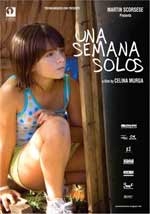 “Nuestro objetivo final es nada menos que lograr la integración del cine latinoamericano.
Así de simple, y así de desmesurado”.
“Nuestro objetivo final es nada menos que lograr la integración del cine latinoamericano.
Así de simple, y así de desmesurado”.
Gabriel García Márquez
Presidente (1927-2014)


-

La argentina Una semana solos se arriesga con una estructura coral
Tras el retrato individual de una joven que regresa a su ciudad de origen que propuso en su ópera prima, Ana y los otros, Celina Murga se arriesga en su segunda película con un filme de estructura coral y con unos personajes (niños de entre 7 y 14 años) bastante más complejos. Puede que Una semana solos no resulte tan redonda como aquel debut, pero esta talentosa directora sortea muy bien los riesgos de semejante empresa.
Un grupo de hermanos y primos se quedan solos durante una semana (con un mínimo control por parte de una empleada doméstica) en el ámbito cerrado de un country. En ese contexto, Murga se concentra en las experiencias cotidianas, desde las más banales (travesuras, coquetería, celos, tedio, relación con la música, adicción a los videojuegos y a la televisión) hasta las más crueles (los prejuicios de clase, el racismo o el vandalismo), mientras pinta un mundo cerrado donde afloran las diferencias sociales, las inseguridades, el despertar sexual y la falta de límites.
Murga nos permite "espiar" a sus personajes y jamás cae en la denuncia obvia y exaltada, en el subrayado, en la bajada de línea o en el psicologismo barato a la hora de retratar a los chicos (y, aunque no estén presentes, también a los adultos que han dejado su marca por acción u omisión).
La directora, tal como ya lo había demostrado en Ana y los otros, demuestra una gran ductilidad y sensibilidad en el trabajo con los aquí pequeños actores (todos impecables) y, si bien la historia se extiende demasiado y por momentos se extraña una mayor contundencia dramática, resulta un verdadero hallazgo, tanto en términos de la narración cinematográfica, como en el terreno del ensayo sociológico sobre un fenómeno que en los últimos años marcó a la clase media-alta de los centros urbanos. The Argentine feature fim Una semana solos takes the risk of a coral structure
The Argentine feature fim Una semana solos takes the risk of a coral structure
After the individual portrait of a young girl that returns to her birth city proposed by Celina Murga in her first work, Ana y los otros, this film director assumes in her second film the risk of a coral structure and some quite more complex characters (a group of children between 7 and 14 years of age). Maybe Una semana solos does not turn out as accomplished as her first work, but this talented film director surpassed the challenges of such an enterprise.A group of siblings and cousins are left alone for a week (with a minimum control on the part of a maid) in the closed environment of a country house. In that context Murga concentrates on the daily experiences, since the most banal ones (antics, flirtation, jealousies, tedium, the relationship with the music, addiction to the video games and the television) to the cruelest ones (class prejudices, racism or vandalism), while she portrays a secluded world in which emerge the social differences, the insecurities, the sexual awakening and the absence of limits.
Murga allows us "to spy" her characters and never indulges in the obvious and exalted denunciation, exaggeration, slow pace, or superficial psychological approaches in depicting the boys (and, although they are not present, the adults that left their mark through their acts or their absence).
The director, just as she had already evidenced in Ana y los otros, demonstrates a great ductility and sensibility in the work with the young actors (all impeccable in their roles) and, although the story takes too long and at some points demands a greater dramatic effect, it proves to be a true revelation, so much in terms of the film narrative, as in the field of the sociological essay on a phenomenon that in the last years has characterized the upper-middle class of the urban centers.
















